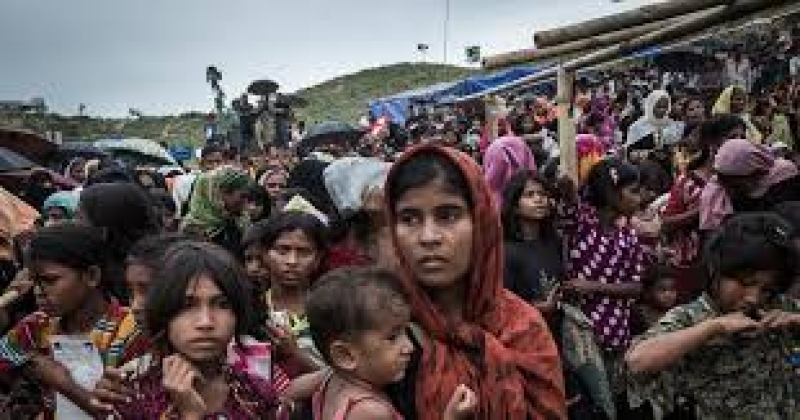- Puppet show enchants Children as Boi Mela comes alive on day 2 |
- DSCC Admin Salam’s drive to make South Dhaka a ‘clean city’ |
- 274 Taliban Dead, 55 Pakistan Troops Killed |
- Now 'open war' with Afghanistan after latest strikes |
- Dhaka's air quality fourth worst in world on Friday morning |
Funding Cuts Raise Monsoon Risks for Rohingyas: UNHCR

Reductions in funding for a community maintenance programme in the Rohingya camps of Cox’s Bazar have not only affected their incomes but also compromised safety during the monsoon season, the UN Refugee Agency (UNHCR) has warned.
In the world’s largest and most congested refugee camp, home to over one million Rohingyas, life is always difficult. But monsoon rains make conditions even worse—turning narrow paths treacherous and threatening essential sanitation infrastructure such as latrines and water points with landslides.
Since 2020, UNHCR has supported a programme where refugees were paid small amounts to carry out essential work like path repairs and slope stabilisation.
It offered more than income—refugees could contribute to their community’s upkeep while supplementing their limited food rations.
However, due to the global aid funding shortfall, this initiative has faced severe cuts. While each project previously engaged 30 to 40 refugees current funding only allows for seven or eight workers in a few remaining projects.
The funding decline is documented in a new UNHCR report that highlights the consequences of the global humanitarian funding crisis on displaced populations.
In Bangladesh, the report notes, the cuts are weakening an already strained aid response, leaving refugees—who rely entirely on external assistance—more vulnerable in terms of food, health care, education, and shelter.
A vital lifeline
Jahid Alam, a 45-year-old father of two, said he used to spend his earnings from maintenance work on extra food for his children.
“The amount of food we get every month is limited,” he says quietly. “With the extra work, I could buy some variety for my children. Now, that is no longer possible.”
Jahid and his wife both have disabilities. Participating in maintenance work not only improved their nutrition but also kept them socially connected.
“[This] was never just a programme – it was a vital lifeline,” says Afruza Sultana, who works in Site Management Support for BRAC, a key partner in the refugee response in Bangladesh. “It gave them more than just a wage – it gave them purpose, dignity, and the means to feed their families and make alternative arrangements for basic needs.”
She noted the programme cuts were triggering “ripple effects,” with some children being withdrawn from learning centres and parents resorting to unsafe or exploitative work, or even attempting dangerous migration journeys.
Critical infrastructure at risk
The funding shortage is also impacting the maintenance of vital infrastructure, especially during monsoon season when upkeep of roads, bridges, paths, and latrines is essential.
In early 2024, roughly 5,500 refugees worked on over 500 infrastructure projects. This year, activity has declined by nearly two-thirds, leaving the camps increasingly exposed. Eroded roads, blocked drains, and broken bridges are now common.
“These aren’t just inconveniences,” says Afruza. “They are daily hazards that threaten safety, health and mobility in the camps.”
As monsoon rains continue, 24-year-old Jaynub Begum is concerned about the deteriorating pathways near her shelter. Last year, she helped build stairs in a steep area of the camp. This year, such work is absent.
“There is a latrine near our shelter at risk of landslides, and we are scared to use it now,” she says. “There is no initiative to protect it.”
Beyond infrastructure, the funding crisis is affecting other essential services.
With more Rohingyas arriving from Myanmar, resources are further stretched.
UNHCR warned at a 11 July press briefing that without additional funding, further disruptions are expected in health services, cooking fuel distribution, food aid, and education for children, reports UNB.
“Humanitarian funding may be shrinking, but the needs on the ground are not,” says Afruza. “We urge the global community to remember that behind every budget line are human lives, aspirations, and the fragile stability of one of the world’s most vulnerable populations.”

